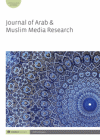- Home
- A-Z Publications
- Journal of Arab & Muslim Media Research
- Previous Issues
- Volume 6, Issue 1, 2013
Journal of Arab & Muslim Media Research - Volume 6, Issue 1, 2013
Volume 6, Issue 1, 2013
-
-
The social semiotics of hijab: Negotiating the body politics of veiled women
More LessAbstractHijab and other forms of Islamic head cover have become indelibly associated with notions of inequality and repression in the minds of many non-Muslims. This article queries the meanings and functions of hijab within both Muslim and non-Muslim contexts. It begins by exploring hijab as a transcendental signifier and the epistemological challenges it poses to the gaze. The discussion shifts to focus on the social semiotics of hijab in Arab/Muslim contexts and the myriad fashions and signifieds associated with hijab before situating the hjiab within the western context of the society of enjoyment. The article concludes that the repressive hypothesis associated with hijab is too reductionist to explain the complex and multiple meanings attached to it.
-
-
-
News coverage of the 2010 Iraqi general elections
More LessAuthors: Ahmed K. Al-Rawi and Barrie GunterAbstractThis study investigates the tone of election news coverage in the evening newscasts of four Iraqi satellite TV channels: Iraqia (government-run), Furat (Shiite), Hurria (Kurdish) and Baghdad (Sunni) for two weeks leading up to the general election. A total sample of 56 evening newscasts containing 857 news stories that were related to the election was analysed. Although all channels claimed to be addressing all Iraqis and to be following the principles of professional journalism, the evidence presented here argues that all four channels disregarded professional news values. Even the state-run al-Iraqia channel, that is supposed to be independent, showed preferences for some topics over others.
-
-
-
The role of social media in the formation of public opinion towards Islamists: A content analysis
More LessAbstractInternet technologies – and specifically social media – have provided Egyptians with a new public space for communication and expression, as they offer a chance to participate in discussions about matters of common concern. The virtual world of Face-book offers participants a chance to interpret news provided by the media, shape or re-shape them according to their ideologies and post them via the wall, which is considered a free open forum for discussion.
This research aims to investigate the way users of social media – particularly Facebook groups and Twitter users – express their opinions towards the emerging Islamic movement in Egypt. It argues that both comments and opinions expressed through social media – whether pro or anti-Islamist – show specific frames of expression that are formed and spread over the interactive nature of social media. Research questions investigated the different frames used by Islamists and non-Islamists; the arguments or reasons used by social media users to support those frames; the descriptions of evidence used to support their point of view; and finally, the overall tone of the social media message. The wall comments on online editions of newspapers and Tweets have been analysed using qualitative content analysis. The analysis was conducted across two phases in the years 2011 and 2012. The results of the content analysis verified the development of a new negative attitude towards Islamists, and a shift from positive attitudes and optimistic public opinion towards Islamists to the opposite side of having a negative public opinion towards their political performance.
-
-
-
The crisis of contemporary Arab television: Has the move towards transnationalism and privatization in Arab television affected democratization and social development in the Arab world?
More LessAbstractThe Arab media have witnessed a radical shift starting in the 1990s with the emergence of a wide range of private satellite-TV channels. These new TV channels, such as MBC (Middle East Broadcasting Center) and Al Jazeera have rapidly become the leading Arab channels in the realms of entertainment and news broadcasting. These transnational channels are believed by many scholars to have challenged the traditional approach of their government-owned counterparts. Alternatively, other scholars argue that despite the easy flow of capital and images in present Arab television, having access to trustworthy information still poses a challenge due to the governments’ grip on the production and distribution of visual media. This article brings together these contrasting perspectives, arguing that despite the unifying role of Arab satellite TV channels, in which national challenges are cast as common regional worries, democratization and social development have suffered. One primary factor is the presence of relationships forged between TV broadcasters with influential government figures nationally and regionally within the Arab world. I have also based my findings on personal communication with TV professionals at the second Moroccan satellite TV channel known as 2M.
-
-
-
Arab investigative journalism practice
More LessBy Naila HamdyAbstractGiven investigative journalism’s purpose of providing accountability and exposing wrongdoing of governments and business, this study examines whether changes in political circumstances due to the Arab revolutions have given rise to the production of more investigative reporting, whether Arab journalists have the same understanding of the meaning of investigative journalism as their western counterparts, and if individual or organizational characteristics encourage or hinder journalists’ performance. Findings indicated that changes in the political environment did not generally help them conduct such reporting. Results also indicated that individual, organization or ownership types did not dictate their capacity to perform such investigations. Rather the ability depended on how much the individual journalist believed and understood this to be a unique type of journalism genre as well as whether they were advanced enough in their career to perform such in-depth work. The results also indicated that Arab journalists believe in their ability to make change and are motivated by a sense of self-fulfillment to provide the public with watchdog journalism.
-
Most Read This Month


